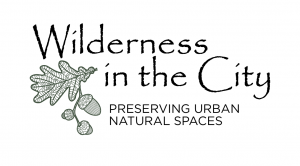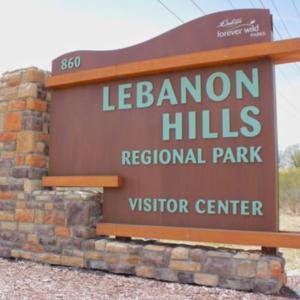OUR HISTORY
Wilderness in the City was started ten years ago in response to a development proposal for Lebanon Hills Regional Park. The plan for paved bike trails would have fundamentally altered the park’s large, minimally developed, wilderness-like environment close to the Twin Cities’ urban core.
Eagan residents who attended the open house, Holly Jenkins and Maryann Passe, established Wilderness in the City in May 2013 as a grassroots citizen-based organization. The purpose was to inform and educate the public about the County’s plan for Lebanon Hills, and to inform and advocate in favor of managing and restoring Lebanon Hills Regional Park’s natural environment and providing less impactful access to that experience. In September 2014, Wilderness in the City was approved as a 501(c)3 organization
The paved trails were diverted, and we continue our work for the park’s ecology.
CONTROVERSIAL 2015 MASTER PLAN UPDATE PROCESS
2012: The Dakota County Board of Commissioners determined that a Master Plan update was required for Lebanon Hills in order to complete the vision of the 2008 Dakota County Parks System Plan. This update would replace the 2001 Lebanon Hills Master Plan, which was created by a citizen task force and had broad public support. The 2008 Park System Plan, created by staff and consultants, envisioned a 200+ mile greenway bike trail network, including a paved regional bike trail through Lebanon Hills which would serve as the “hub” of the greenway network. This vision would take Lebanon Hills in a new direction.
November 2013: The original draft plan was released for public comment and review. Prior to the official release, the County had already received a significant number of comments from individuals who were opposed to the new vision for Lebanon Hills. Following a 60-day period, including two open houses, public input received was overwhelmingly opposed to the Plan. Wilderness in the City was formed to inform and advocate in favor of managing and restoring Lebanon Hills Regional Park’s natural environment and providing less impactful access to that experience.
February 2014: In response to public reaction, the Board delayed approval of the draft plan, and they established the Lebanon Hills Citizen Advisory Panel to review and provide input in the draft plan. A Final Report from the Panel and a Minority Report, were presented to the Board in January 2015.
January 2015: Some changes were made and a revised Draft Plan was released for a 30-day Public review period; more than 600 people from across the metro region weighed in on the revised draft. As reported in the Star Tribune, 97% of public comments received were opposed to the Plan, the “connector trail” in particular.
March 2015: After a contentious two-year process, in a 5-2 vote the Board of Commissioners Approved the controversial 2015 Lebanon Hills Master Plan with some changes — most significantly, that the Connector Trail would not be a segment of the Greenway network. The Plan was submitted to Met Council for adoption. Consistent with the previous two years, many people attended and commented at public meetings and submitted written comments — the vast majority opposing the Plan and also the Process, which many felt lacked meaningful citizen involvement.
August 2015: The Community Development Committee of the Metropolitan Council recommended adoption of the 2015 Master Plan. (View the entire meeting). The Committee Chair allowed three individuals who opposed the Plan to speak for 3-minutes each; others members of the public in attendance who opposed the plan were not allowed to speak.
In a unified message for those opposed to the Plan, a spokesperson from Wilderness in the City commented, emphasizing two areas where the Plan was inconsistent with Met Council Policy: citizen participation and protecting the environment/ecology of the site. These two areas of inconsistency were never addressed or responded to by the Committee. The Chair then allowed 3 comments in support of the plan; no one came forward. The committee unanimously recommended adoption of the 2015 Master Plan.
The controversial $27 million 2015 Lebanon Hills Master Plan was formally adopted by the Metropolitan Council. (View the entire meeting). Two citizens provided comments expressing concern for the process to date. No discussion took place, and the Plan was approved unanimously by the Metropolitan Council members. With this action, the Plan became eligible for implementation and funding.

